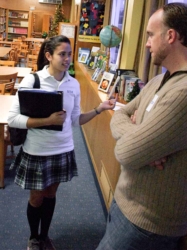Bay State CRS shares experience with Hingham Catholic school students
A Massachusetts man on Christmas leave from his Catholic Relief Services mission in Afghanistan spoke Dec. 10 at Hingham’s Notre Dame Academy about his work in that war torn land.
“It is difficult to know where to start,” said Matthew McGarry, the country representative for CRS’s Afghanistan program, during a discussion he led in the school’s library. “Afghanistan is a country many times invaded and never conquered.”
The security situation in the country has deteriorated significantly in the last two years, but CRS is not active in those regions, he said.
His agency is the official humanitarian relief agency of the United Conference of Catholic Bishops, he said. “So, since this is a Catholic school, I work for you.”
A self-proclaimed hater of slide presentations, McGarry told students in the beginning of his talk that he was going to let his collection of images of the country and its people play through projected on the screen as he gave them his situation report.
The slides were a remarkable array of stunning landscapes and scenes, tragic and glorious, capturing the Afghani people struggling to build, farm, trade and educate themselves out of centuries of isolation and poverty.
Among the programs McGarry described was a tomato co-operative in which CRS brought together 300 farmers to buy seeds and sell their produce directly to a paste factory as one entity, thus retaining for themselves the middleman’s profit.
Another program CRS supports is the building of greenhouses to extend the country’s growing season, he said. With a longer growing season, farmers can charge higher prices for food in the winter.
Of the 30 million people in the country, 8 million Afghanis face food insecurity, which escalates to starvation through the winter and into the spring before the first harvests, he said.
McGarry said a major problem facing farmers and the rest of the country is the fact that Afghanistan is one of the least water secure countries in the world and is in the midst of a seven-year drought. CRS workers seek fresh water mountain springs that are connected to villages with gravity-fed systems. “Too often a village’s water supply is mixed with places where people throw trash and wash cars and animals.”
Topsoil management is another area of concern, he said. “Land is denuded and overused, and because in the winter shrubs are pulled for heating fuel, so the topsoil is often washed away.”
CRS creates watersheds and trenches to control water erosion and teaches crop rotation techniques, he said.
Because of the constant warfare that has afflicted the country for the last 30 years, especially during the period of Taliban rule, the education available to children has been inconsistent for boys and virtually nonexistent for girls, he said.
To meet this need, CRS approaches villages and offers to build and support a school for girls with an accelerated learning program that compresses the equivalent of six years of school into three years, he said. If, and only if, the villagers consent, CRS selects a local teacher, preferably the most educated woman in the area or a mullah, and establishes the school.
The Afghani government supports the program of building girls schools and the longer range plan is to eventually fold these schools into the country’s formal education system, he said.
Seven months into his job, he is pleased with CRS’s innovative approach to long-term integrated development of agriculture, water, education programs, gender equality and a strong emergency response capacity, he said. “I love it so far, it is never dull.”
These are days of cautious optimism in Afghanistan, McGarry said. “For the last 25 years, Afghanistan has been plagued by natural and man-made disasters ranging from war and drought to earthquakes and terrorism.”
Despite this history of challenges, the Afghani people are resilient and have survived through harsh and dangerous conditions with humility, he said. “There is a great deal that my colleagues and I could learn from the villagers.”
Dedicated solely to humanitarian relief, CRS does not advance the Catholic faith in any way. Rather, McGarry said, its only mission is to address the needs of people in trouble in the spirit of social justice. “Our help is based on need, not on creed.”
In fact, in a country that is almost entirely Muslim and in which it is illegal to proselytize Christianity, the policy is both appropriate and a matter of basic security, he said.
Although the visit was arranged on short notice when McGarry contacted the school to say he was available to speak there, it fit in perfectly with the academy’s “One Book, One School” curriculum, which has the entire school reading the same book and participating in activities related to the book and its subjects and characters, said Patricia G. Bologna, the school’s librarian. “We didn’t expect this, but it dovetails perfectly.”
Currently, the student body is focusing on “Three Cups of Tea” by mountain climber Greg Mortenson and journalist David O. Relin about the climber’s one-man campaign to build schools in the rural villages of Afghanistan and Pakistan, she said. Other speakers on the subject are Belmont photographer Paula Lerner, whose recent book is “The Women of Kabul” and Sister Joan Burke, SNDdeN, the order’s representative to the United Nations, who spoke to the students about the need for education for women as a human right.
Bologna said that in addition to McGarry’s meeting with morning classes in the library, the relief worker spoke at a student body assembly after lunch.
More information about Notre Dame Academy is available at www.ndahingham.com. To learn more about the work of Catholic Relief Services visit www.crs.org.



















